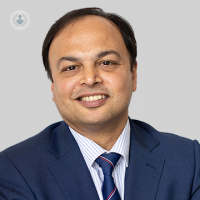Early pregnancy problems: first trimester
Autore:Early pregnancy is a time of rejoice and excitement. However, 1 in 5 to 1 in 3 women go through various complications that can induce uncertainty and emotional stress. Fertility consultant Mr Parijat Bhattacharjee discusses the likeliness of pregnancy complications arising through weeks 1 to 12, the first trimester.

What problems could arise during the first trimester?
The commonest symptom that women often complain of is excess nausea and vomiting, particularly early in the morning. Usually this is self-limiting but occasionally may need medical input or even hospital admissions. Miscarriages, unfortunately, are much more common than we think. 1 in 5 pregnancies probably ends in miscarriage. However, the chance of a recurrent miscarriage (3 consecutive miscarriages) is rare. The most serious complication in early pregnancy is an ectopic pregnancy, which fortunately is rare (1%). The pregnancy occurs outside the cavity of the womb, commonly in the fallopian tube & rarely in other sites. This can lead to internal bleeding (in the tummy) and can be potentially fatal. Lastly, molar pregnancy is a rare complication where the placental tissue grows abnormally. This generally needs further follow up after ending the pregnancy (which is mostly non-viable).
What can cause problems during early pregnancy?
Most women having complications in early pregnancy do not have any risk factors and possibly cannot be prevented. To decrease the risk of miscarriage, controlling any pre-existing medical condition, such as diabetes, is important, or changing any medications that can affect the pregnancy, such as some taken for epilepsy or high blood pressure. Also, eating a healthy diet (avoiding soft cheese, pate and liver etc.) is important, as is consulting your doctor about medications. Taking Folic acid is important. Some women may need a higher dose. Women who have a past history of pelvic infections or sexually transmitted infections or previous surgery or using copper coil (IUCD) should seek medical help early particularly if they have abnormal bleeding or tummy pain. There is a slightly increased risk of ectopic pregnancy.
What symptoms should I be aware of during the first trimester?
If nausea and vomiting increase to an extent where one cannot even keep fluid (water) in or feels week and exhausted, one should see a doctor. She may need intravenous fluid and possibly anti sickness medicines. Bleeding is the commonest symptom in early pregnancy. Most bleeding is harmless but can be a sign of miscarriage or even more serious conditions like an ectopic pregnancy or molar pregnancy. Some lower tummy discomfort is common because of the growing womb but severe pain or one-sided lower tummy pain need to be checked by a doctor to exclude ectopic pregnancy.
How often do I see my gynaecologist?
All women with any pre-existing medical condition or on long-term medications should see a gynaecologist before trying to conceive to optimise and alter treatment if necessary. Anyone with a previous history of pregnancy problems, particularly early pregnancy problems should have a low threshold to see a gynaecologist particularly if they have symptoms like bleeding or pain to have an early ultrasound scan and other tests as needed. If one had an ectopic pregnancy one should see a gynaecologist early to ensure the pregnancy is in the womb. Some women may need repeat visits depending on the symptoms, particularly bleeding. Scans may be inconclusive in early pregnancy and may need repeating or complementing with other blood tests.


